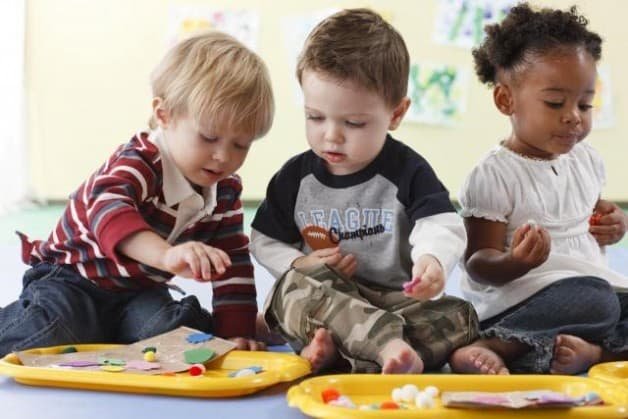
Different Stages of Play
This page contains affiliate links for which we may be compensated
Last updated: October, 2024
As children grow and develop, their play evolves through various stages, each crucial for their overall development. From solitary play to cooperative play, understanding these stages can provide valuable insights into your child’s cognitive, social, and emotional development. In this guide, we’ll explore the different stages of play and offer tips on how parents can support and encourage their children at each stage.
Solitary Play
Solitary play is typically observed in infants and toddlers, where children play alone and are engrossed in their own activities. During this stage, children explore their surroundings, manipulate objects, and begin to understand cause and effect. Parents can encourage solitary play by providing age-appropriate toys and a safe environment where children can freely explore and discover on their own.
Recommended Toys
- Musical instruments
- Stacking cups
- Board books
- Wooden magnets
- Toy cars
Unoccupied Play
Unoccupied play, often observed in infants, may appear aimless at first glance. During this stage, children engage in random movements and exploration without a specific goal or focus. They might wiggle their fingers, babble, or gaze at their surroundings with curiosity. While it may seem passive, unoccupied play lays the foundation for sensory exploration, motor skill development, and cognitive growth. As a parent, you can foster unoccupied play by providing a safe and stimulating environment with age-appropriate toys and sensory materials. Encourage exploration through tummy time, sensory play, and gentle interaction to support your child’s early development.
Recommended Toys
- Cloth books
- Fabric scraps
- Textured balls
- Velcro strips
- Teddies
Parallel Play
Parallel play usually occurs in toddlers and young preschoolers, where children play alongside each other without actively engaging with one another. While children may mimic each other’s actions, they do not directly interact. This stage is important as it allows children to observe and learn from their peers while still maintaining a sense of independence. Parents can facilitate parallel play by arranging playdates and providing opportunities for children to interact with peers in a supportive environment.
Recommended Toys
- Sidewalk chalk
- Playdoh
- Peg puzzles
- Placement boards
Associative Play
Associative play typically emerges in older preschoolers and involves more interaction and communication among children. During this stage, children engage in similar activities and may share toys or materials, but there is still limited organization or coordination in their play. Parents can encourage associative play by providing opportunities for group activities such as art projects, building blocks, or imaginative play.
Recommended Toys
- Sand and water table
- Swing
- Art Supplies
- Easels

Onlooker Play
Onlooker play is a stage where children observe and learn from others’ play activities without actively participating. It’s commonly observed in toddlers and young children who are curious about their peers’ actions but prefer to remain on the sidelines. During onlooker play, children may ask questions, make comments, or simply watch intently as others play. While it may seem passive, onlooker play offers valuable opportunities for social learning, language development, and perspective-taking. As a parent, you can encourage onlooker play by providing opportunities for your child to observe and interact with other children in a supportive and inclusive environment. Engage in conversations, ask open-ended questions, and validate your child’s observations to foster their curiosity and social skills.
Recommended Toys
- Dolls or puppets
- Dress-up clothes
- Toy Cars
- Jungle gyms
Cooperative Play
Cooperative play is the most advanced stage of play and typically emerges in school-aged children. In this stage, children actively collaborate, plan, and organize their play activities towards a common goal. Cooperative play promotes important social skills such as communication, problem-solving, and teamwork. Parents can support cooperative play by encouraging group games, team sports, or collaborative projects that require children to work together towards a shared objective.
Recommended Toys
- Board games
- Sports Equipment such as balance bikes
- Building Materials like Lego

Conclusion
Understanding the stages of play is essential for parents to provide appropriate support and encouragement for their children’s development. By recognizing and facilitating each stage of play, parents can nurture their child’s social, emotional, and cognitive growth, laying the foundation for healthy relationships and lifelong learning. So, embrace the joy of play at every stage and watch your child thrive!